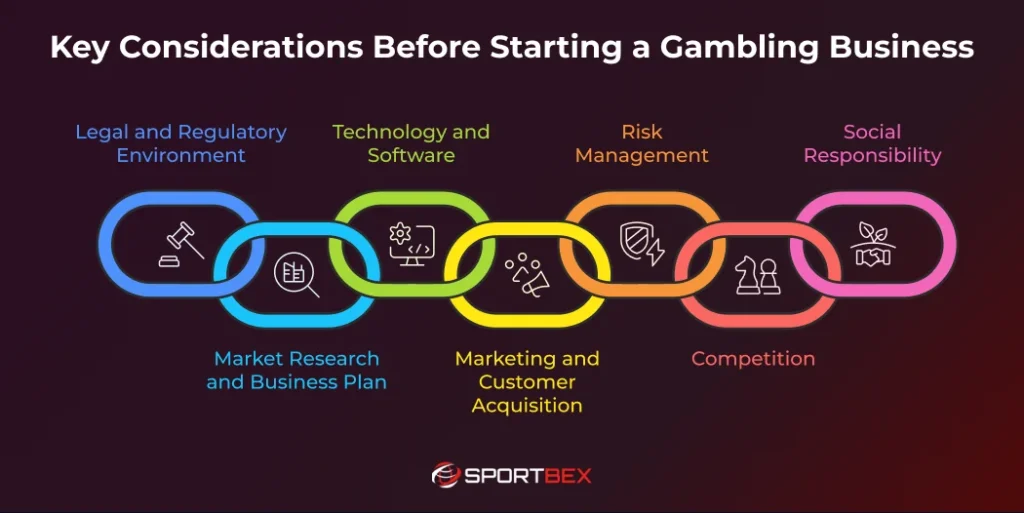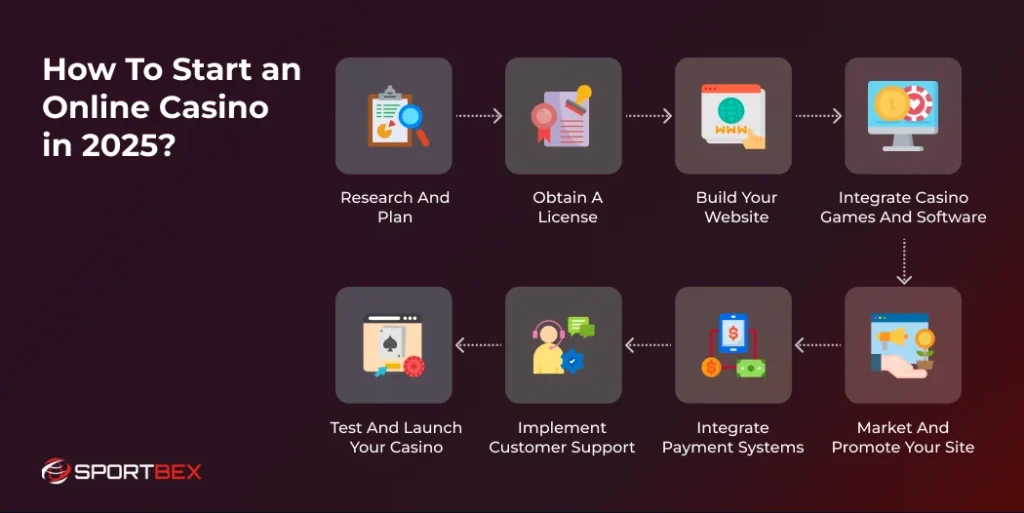The online casino industry is booming, and the idea of launching your own online casino seems more enticing than ever. With global revenue for online gambling projected to surpass $150 billion by 2027, the allure of tapping into this fast-growing market is undeniable.
The industry is driven by advancements in technology, widespread internet access, and the increasing shift toward digital entertainment. However, starting an online casino requires more than just ambition—it involves navigating legal regulations, securing the right software solutions, building a reliable platform, and creating a standout user experience.
So, how do you actually start an online casino and make it successful? Let’s dive into the crucial steps and strategies needed to break into this competitive market.
This comprehensive guide will walk you through everything you need to know about how to start your own online casino, covering every step of the process in detail. You’ll learn about the ins and outs of the industry, from understanding market trends and legal requirements to selecting the right platform that suits your business goals.
We’ll also take you through the process of obtaining necessary licenses to operate legally, integrating essential casino tools such as Casino APIs, payment gateways, and game providers, and even tips for marketing your platform effectively.
Understanding the Online Casino Industry
Before diving into the logistics of setting up your casino, it’s crucial to understand the landscape. Online casinos have grown exponentially in recent years, fueled by advancements in technology such as secure payment systems, live dealer games, and mobile-friendly platforms, Changing legislation and the rising demand for convenience from players.
An online casino essentially allows players to enjoy popular gambling games, such as poker, roulette, and slots, from their computers or smartphones. These platforms can range from simple gaming sites to complex ecosystems offering sports betting, live dealers, and social casino elements.
Currently, online casino users prioritize a few key features:
- Ease of access: Platforms optimized for mobile and desktop.
- A variety of games: From table games to immersive live dealer experiences.
- Secure transactions: Seamless and safe payment gateways.
Types of Online Casinos You Can Launch
Choosing the right casino business model is crucial for long-term success and profitability. Here are three common options to consider:
1. White-label casinos
A white-label casino is a ready-made solution where a provider handles the technical setup, licensing, and initial software, while you focus on branding and marketing. This option is perfect for entrepreneurs looking to enter the market quickly with minimal upfront effort.
2. Turnkey Casino Solutions
Turnkey casinos offer a more customized approach, providing flexibility to adapt the platform to perfectly align with your specific needs and business goals. These solutions come equipped with all the essentials, including casino API providers, a wide range of gaming options, and seamless software connections, but you maintain a higher degree of control.
3. Fully custom-built platforms
Some businesses choose to develop a custom platform from scratch, tailored specifically to their unique needs and goals. This approach allows for complete personalization, ensuring that every feature and functionality is designed to align perfectly with their operations. However, this level of customization comes at a cost—it requires significant time, resources, and expertise.
Key Considerations Before Starting a Gambling Business

Entering the online casino industry involves tackling some essential components. Here are the key areas to focus on before you start an online casino:
1. Legal and regulatory environment
One of the first steps in opening an online casino is understanding the legal and regulatory landscape. Gaming laws vary by country (and often state), so you’ll need an online gambling license to operate legally where your target audience is located.
Licensing authorities like Malta Gaming Authority (MGA) and Curacao eGaming regulate online casinos internationally. Compliance is non-negotiable, and neglecting it could mean heavy fines or even business closure.
2. Market research and business plan
Before taking any concrete steps, it’s essential to conduct thorough market research. Start by clearly identifying your target demographic—who they are, their needs, preferences, and behavior. Then, take the time to analyze your competitors, understanding their strengths, weaknesses, and strategies to find opportunities to stand out. Finally, outline your unique value propositions.
A detailed business plan should include:
- Revenue models.
- Marketing and customer acquisition strategies.
- Operational costs.
3. Technology and software
Your platform’s performance heavily depends on the technology you choose, so it’s crucial to select high-quality solutions. Invest in online casino software from reputed casino software providers such as Microgaming, Playtech, or NetEnt, all of whom are known for their cutting-edge innovations and reliability.
These providers offer a wide array of features, including seamless integration of live games to enhance user engagement, full mobile compatibility to cater to on-the-go players, and secure payment options.
4. Marketing and customer acquisition
Getting people to your site requires persuasive and well-thought-out marketing strategies.
- Social media ads targeting relevant geographies to ensure your content reaches the right audience in key locations where potential customers are most active.
- Search engine optimization (SEO) strategies using high-value keywords like online casino and online casino dealer to improve visibility and rank higher in search engine results, driving organic traffic.
- Affiliate marketing programs designed to encourage third-party partners to promote your services, expanding your reach and increasing referrals through established affiliate networks.
5. Risk management
The gambling industry is inherently high-risk, requiring businesses and individuals to navigate complex regulations, financial risks, and ethical concerns. It is crucial to practice vigilance in:
- Anti-fraud measures: Implement robust identification systems to prevent underage gambling.
- Casino payment gateway protection: Ensure all transactions are encrypted and compliant with payment protocols.
- Responsible gambling tools: Offer features like self-exclusion and deposit limits to promote ethical gambling practices.
6. Social responsibility
Integrating responsible gambling tools isn’t just ethical; it’s a smart way to build trust and loyalty with your audience. By offering user-friendly features like daily or monthly spending caps, time reminders, and self-exclusion options, you empower players to maintain control over their gaming habits.
These tools not only encourage healthier behavior but also promote transparency and accountability, helping to create a more sustainable and positive relationship.
How to Start an Online Casino in 2025

If you’re ready to turn your entrepreneurial dream into reality, here’s how to take actionable steps toward opening your online casino.
1. Research and plan
Start by thoroughly analyzing the legal requirements in your target market, including the necessary regulations and compliance standards.
Research licensing options to ensure your business operates within the law, and look into potential providers for casino API solutions or turnkey platforms that can support your needs. Evaluate their offerings, integration flexibility, and reputation in the industry.
Additionally, create a comprehensive business plan that outlines your goals, budget, and timeline, while clearly defining your niche to differentiate yourself from competitors and attract your target audience effectively.
2. Obtain a license
Apply for an online gambling license in the jurisdiction of your choice to operate legally and securely.
The process typically requires submitting detailed financial proofs, including audited statements, to demonstrate stability, as well as technical documentation to ensure compliance with regulatory standards.
You’ll also need to pay the necessary licensing fees, which can vary depending on the region. Choosing the right jurisdiction is crucial, as requirements and regulations differ widely, so thorough research and preparation are essential for a successful application.
3. Build your website
Whether you use Casino API provider platforms or hire custom developers to build your online gaming site, it’s important to focus on delivering a seamless and engaging experience. Ensure your site offers:
- User-friendly navigation.
- Fast loading times.
- Mobile-friendly design (mobile casino compatibility is essential).
4. Integrate casino games and software
Partner with leading casino game providers like NetEnt, Evolution Gaming, or Pragmatic Play to offer a wide variety of high-quality games that cater to all player preferences.
Expand your platform with a diverse selection, including engaging slots, classic table games like blackjack and roulette, immersive live dealer rooms for a real casino feel, and even sports betting api options for sports enthusiasts.
Enhance your offerings further by integrating sports API solutions, giving players access to live odds, match statistics, and seamless betting experiences.
5. Market and promote your site
Focus your marketing efforts on building brand awareness and fostering a loyal community around your platform. Start by engaging your audience through well-crafted emails, informative blog posts, and active social media interactions.
Share valuable content that resonates with their interests, such as industry insights, tips, or updates.
At the same time, optimize your platform with strong SEO strategies by targeting high-value keywords like how to start an online casino or online casino application.
6. Integrate payment systems
Implement safe and fast transaction options with a casino payment gateway to ensure smooth and secure financial operations for your players. Support popular payment methods such as credit cards, e-wallets, bank transfers, and even cryptocurrencies to cater to a wide range of preferences.
A reliable payment gateway also enhances trust and encourages player retention. Additionally, set up 24/7 customer support to promptly address player concerns related to payments, withdrawals, or account issues, ensuring a seamless and satisfying user experience.
7. Implement customer support
Customer satisfaction is paramount to building trust and loyalty. Ensure you provide 24/7 support through multiple channels, including live chat, email, or phone calls, to address player queries promptly and effectively.
Quick and efficient responses not only resolve issues but also enhance the overall player experience, making them feel valued and supported at all times.
8. Test and launch your casino
Before going live, thoroughly test your platform to ensure all features and functions work seamlessly. Pay close attention to user interactions, navigation, and overall performance to identify any quirks or bugs.
Resolve these issues promptly to provide a polished, professional experience on launch day that leaves a positive impression on your users. Comprehensive testing helps avoid potential setbacks and builds trust with your audience from the start.
How Much Does It Cost to Start an Online Casino?
Opening an online casino requires a significant capital investment, as there are many factors to consider. From obtaining the necessary licenses and certifications to purchasing advanced gaming software and building a secure, user-friendly website, the costs can add up quickly.
Here’s a breakdown of potential expenses to help you plan:
- Gaming license: Securing a gaming license typically costs between $25,000 to $50,000 in most jurisdictions. The exact cost depends on the region, as well as the type of gaming activities you plan to offer. This is a critical step to operate legally and build trust with your users.
- Software integration: Expect to spend between $50,000 to $150,000 for integrating reputed white-label or turnkey solutions. These solutions provide ready-made software that can be customized to fit your brand and services, offering a faster way to launch your platform with reliable features.
- Custom platform development: For businesses seeking a unique and fully customized platform, development costs can exceed $500,000. This investment covers everything from design and functionality to security measures, ensuring you create a tailored user experience from the ground up.
- Marketing expenses: Marketing costs can vary widely, but it’s smart to allocate around $20,000 for initial campaigns. This includes digital ads, social media promotions, and other outreach efforts to build brand awareness and attract your first users.
Get a Ready-Made Platform On Rent.
Get Started Today
Conclusion
Launching your own online casino might seem like a massive undertaking, but with proper planning, a solid understanding of the market, and the right partners, it’s well within reach. The online gambling industry continues to grow rapidly, offering countless opportunities for entrepreneurs willing to dive in.
Whether you’re starting small with turnkey solutions that provide ready-to-use platforms or aiming for a fully custom-built empire with unique features and branding, there’s room for innovation and success.
If you’re ready to take the plunge into the world of online casinos, remember that success lies in solving player problems, offering variety, and promoting responsible gambling practices. For personalized guidance or to get started, feel free to contact us online casino experts today.
Understanding your audience is key—what do they need, and how can you enhance their experience? Offering a wide range of games, secure payment methods, and reliable customer support can set you apart from the competition.
Frequently Asked Questions
Yes, but each country has different regulations. You'll need to obtain an online casino license that covers your geographical operations.
These tools promote ethical operations, safeguard players, and build greater trust among users.
With white-label casino solutions, startups can enter the market with fewer upfront costs while focusing on branding.
Building a strong player base starts with offering a diverse selection of games, attractive bonuses, and a seamless user experience. Invest in effective marketing strategies such as social media campaigns, affiliate partnerships, and email promotions to reach your target audience.
Your platform should feature a mix of popular games that cater to a range of player preferences. Classic options like slots, blackjack, roulette, and poker are essential. Consider incorporating live dealer games for a more immersive experience, as well as niche or themed games that make your casino stand out.
Recent Blog
What Are IPL Cricket Betting and How Do They Work?
February 2, 2026
 11 min
11 min
How Sportsbooks Use Real-Time Data Through a Football Betting Odds API
February 2, 2026
 7 min
7 min






